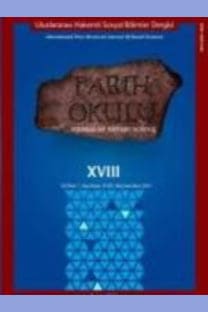COACHES’ PERCEPTION OF VALUES EDUCATION: A SAMPLE OF ELAZIĞ
Antrenörlerin Değerler Eğitimine Yönelik Görüşleri: Elazığ İli Örneği
___
Akandere, M., Baştuğ, G. & Güler, E D. (2009). The Effect of participation in sports in secondary education institutions on moral development of children. Niğde Üniversitesi Beden Eğitimi ve Spor Bilimleri Dergisi, 3(1), 59-68Akbaba-Altun, S. (2003). Education management and values. Değerler Eğitimi Dergisi, 1(1), 7-18.
Aydın, M. (2003). Value perception of the youth: The example of Konya. Değerler Eğitimi Dergisi, 1(3), 121-144.
Bozkurt, E. & Tel, M. (2016). Opinions and perceptions of physical education students about value education. Academic Journals, 11(20), 1918-1924.
Çağlar, A. (2010). The Importance of values education. http://www. toder.org/sayfa/degerler_egitiminin_onemi_1., Access date: 19.01.2021
Çağlayan, E. (2018). Assessment of Parents and Teachers' Attitudes towards Values Education and Practices: Bingöl Example. Master thesis, Bingöl University, Social Sciences Institute.
Demircioğlu, İ. H. & Demircioğlu, E. (2016). History education and values. International Periodical for the Languages, Literature and History of Turkish or Turkic, 11(3), 2225-2242.
Elbir, B. & Bağcı, C. (2013). Evaluation of post-graduate theses on values education. Turkish Studies-International Periodical for the Languages, Literature and History of Turkish or Turkic, 8(1), 1321-1333.
Kapkın, B., Sağlam, M. & Çalışkan, Z. (2018). Examination of postgraduate studies on values education conducted between 1999-2017 in Turkey. Journal of Values Education, 16(35), 185-209.
Keleş, M. & Yoncalık, O. (2019) Physical education and sports lesson and values education in eighth grade students of primary education. Niğde Üniversitesi Beden Eğitimi ve Spor Bilimleri Dergisi, 13(3), 230-237.
Koç, S. (2016). Views of secondary school teachers on values education. Kırıkkale University Journal of Social Sciences, 6 (1), 377-396.
Kuter ÖF., Kuter M. (2012). Values education through physical education and sports. İnsani Bilimler Dergisi: Teori ve Uygulama, 3(6), 75-94.
Özen, Y. (2016). Değerler Neye Değer (trans.: What are the values worth), 1st Edition. Gece Kitaplığı Publications.
Sağın, A. E. & Karabulut, Ö. (2019). Investigation of value levels of secondary school students for physical education and sport (Sample of Bağcılar District). International Journal of Mountaineering and Climbing, 2(2), 27- 34
Thompson, M. (2011). Developing moral values in children: Observations from A Preschool. IfePsychologIA, 19(2), 394-411.
Yaman, E. (2016). Değerler Eğitimi Eğitimde Yeni Ufuklar (trans.: Values education new horizons in education), 2nd Edition. Akçağ Publications.
Yaşaroğlu, C. (2014). The investigation of classroom teachers' attitudes towards the value education in the term of various variables. International Journal of Social Science, 27, 503-515.
Yıldız, M. (2019). Development of the Values Education Scale for Parents with Preschool Children and Determination of the Values Education Approaches of Parents. Master thesis, Gazi University, Institute of Education Sciences.
Yücekaya, M A. (2017). Investigation of Secondary School Students' Values Regarding Physical Education and Sports Lesson. Master thesis, İnonu University, Health Sciences Institute.
- ISSN: 1308-5298
- Yayın Aralığı: 6
- Başlangıç: 2008
- Yayıncı: Ahmet KARA
Antrenörlerin Değerler Eğitimine Yönelik Görüşleri: Elazığ İli Örneği
Yunus Emre KARAKAYA, Abdullah BİNGÖLBALI, Cumaali YAVUZ
ANTİK YUNAN TOPLUMUNDA HETAIRALARIN VARLIĞI
ORTA ÇAĞDA FRANSA NELER ÇEVİRİYORDU?
Mehmet Hasan SELÇUK, Yasin KARACA
ÇOCUK CİNSEL İSTİSMARI VE TOPLUMSAL RİSK FAKTÖRLERİ
Ahmet ÇETİNTAŞ, Ersan ERSOY, Yaşar KAYA, Yeliz AKSÜT
BUHÂRÎ’NİN HADİSTEKİ GARÎB KELİMELERİ ÂYETLE AÇIKLAMASI (el-Câmiu’s-Sahîh Özelinde)
SEZAİ KARAKOÇ’UN “MASAL” ŞİİRİ ÜZERİNE ONTOLOJİK BİR ANALİZ
TÜRKİYE’DE KEMALİZM VE PARTİLERİN DİN SİYASETİ
XVI. YÜZYILIN SON ÇEYREĞİNDE RÛM EYALETİNDE “ŞAH’A MEYLEDENLER”
ÖĞRETMENLERİN DUYGU YÖNETİM BECERİLERİ İLE OKULUN DUYGUSAL İKLİMİ ARASINDAKİ İLİŞKİ
